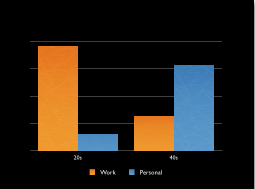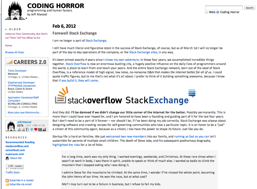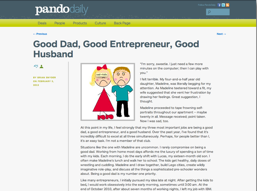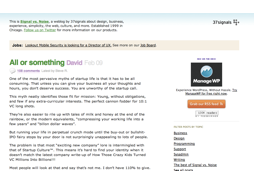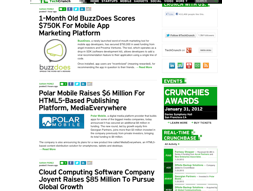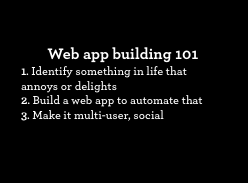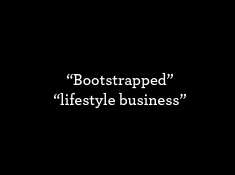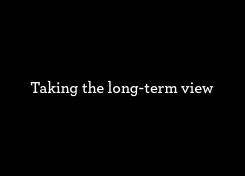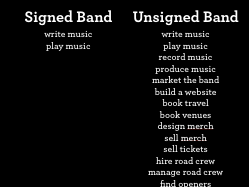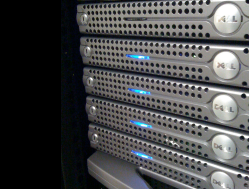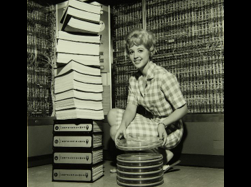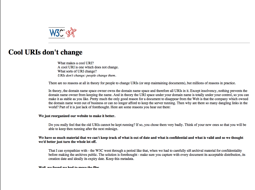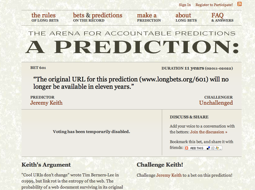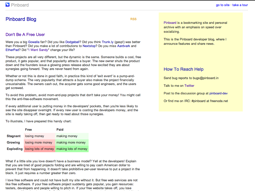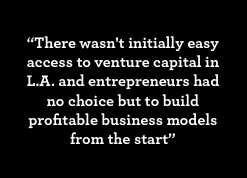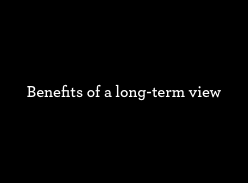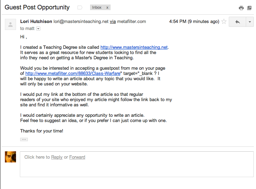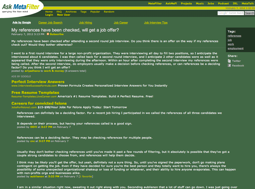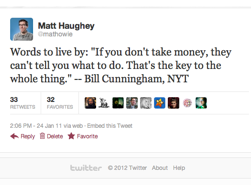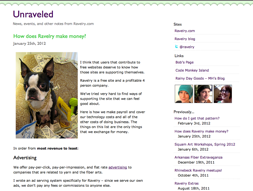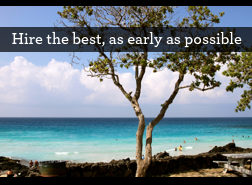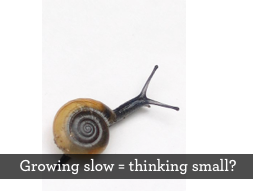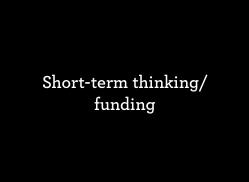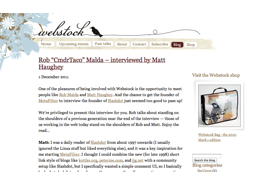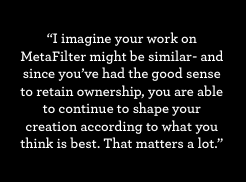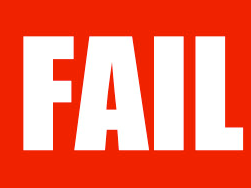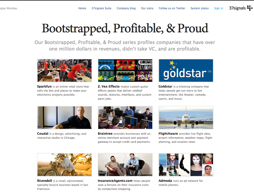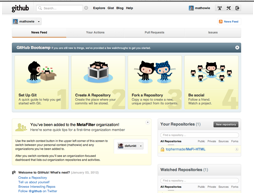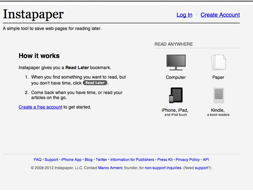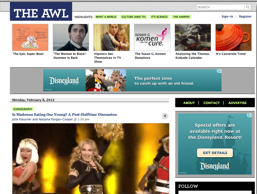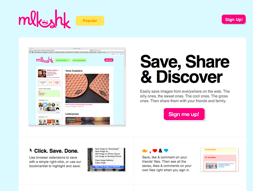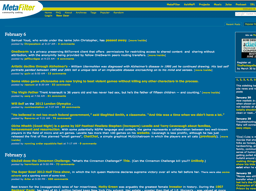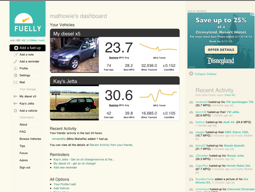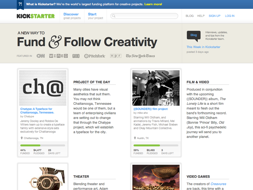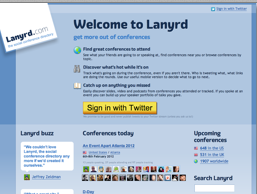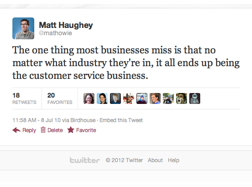My Webstock Talk: Lessons from a 40 year old (now with transcript)
Here's my talk from Webstock last month (a conference I loved):
[vimeo http://www.vimeo.com/38463833 w=500&h=281]
I will say humbly that it's a good talk on important subjects I've been thinking about for the past several years, but I should explain my sheepish, low-energy delivery. My slot was mid-afternoon, and all morning was spent watching one amazing talk after another, as speakers talked about lofty subjects, tied world history to today's web, and generally blew my mind as they jumped from one abstract concept to the next.
I, on the other hand, had this very personal, example-driven, smaller scope real-world kind of talk built around my own history that I hoped could connect with people. As the morning went on, I increasingly started to worry if my talk was going to resonnate. Anyway, I feel like this might be one of my best talks that I happened to deliver poorly. If you have the patience to put up with my "aw shucks" foot shuffling delivery, I swear it'll have some insights into how to run a web business in this day and age.
Rough Transcript from my on-stage notes:
Hello all, I'm really glad to be here in New Zealand. I've had a wonderful time all week in the most beautiful place on earth. I wanted to start off by explaining the title. A few months ago, when I was kicking around ideas for this talk, I was going over ideas with a friend and he noticed a trend in what I've been thinking about lately, how all my ideas were about long term projects and taking things easy and spending time with family and how I sounded like an old man in the go-go world of the Internet. He suggested the title "Lessons from a 40 year old" and it stuck.

So I'm getting old, I'm turning 40 later this year and as they say, wisdom comes with age, which I recently found out was actual science:
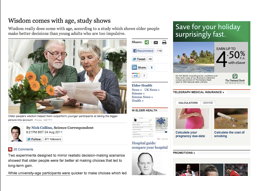
So as I move towards the big Four-Oh, I've been re-evaluating a lot of things in my life.

Turning 40 is a big milestone in our culture. There's the obvious reason and why we have all these "Over the Hill" parties, because you're supposedly about halfway close to death, but I think there's something else going on. It's not just your age and the number, I've noticed among my peers that 40 is a tumultuous year for many reasons and I have some ideas for why it is...
A lot of things converge when you're around the age of 40. If you're an average kind of person, chances are your life has followed a pattern:
- Out of college and into your first apartment/job in your early/mid 20s
- married in your mid-to-late 20s
- children in your late 20s-early 30s
- as you hit 40, your parents are in their mid-60s to mid-70s
So what do all those numbers mean? It means all these things seem to happen at once when you're around 40 and people stress out and often feel overwhelmed.
I have a daughter and she's going to turn 7 soon, and that's a weird age, no longer a baby, not a toddler, not quite a grown-up, and it effects a lot of things. I mainly struggle with how to devote enough time to her and still run a business.
If you got a pet when you moved into your first apartment after college, by the time you hit 40 your cat or dog is nearing 15 years old. Two friends have lost their ~15 year old cats in the past two months and my family had to recently put down one of our cats on the day I flew to this conference.
Marriages are on the rocks for many of my friends. I used to think that web developers/designers were a well-adjusted lot since when we were all about 30, even though the divorce rate is about 50%, I barely knew anyone in the industry that had been through a divorce. Now as I near 40, I see my peers quickly catching up to that nationwide average. I think it's the combo of stress, career, family, and the way your roles as parents change when your children start to grow up. You suddenly stop obsessing over this tiny baby and have time again to interact with your spouse, and sometimes people have changed in the 5+ years since they had a child and time to spend together.
If you're near 40, chances are your parents are in their 60s and 70s and caring for them is a new stress on your life.
My mom recently passed away. She'd felt a little run down and tired the past couple of years, saw a doctor on a routine check-up and got a diagnosis of early stage cancer. Three months later, she was gone, and it was a bit of a shock to the family.
About two years ago I found out I had a tumor at the base of my brain. Lucky for me, I didn’t have to endure surgery. A drug regimen shrank it and my body returned to normal. This sort of led to me freaking out about everything and re-evaluating every decision in my life.
A lot of friends around the age of 40 have had these brushes with death.
I mention all this because it has influenced how I do things these days and how I’ve done things for the past 17 years of building websites. I hope to share some lessons I’ve picked up over the years.
Also, just a warning, if you’re 25 and watching this, if you get nothing else from what I talk about today: be prepared for everything to go bonkers when you hit 40. If you’re prepared for it, it won’t disrupt your life completely.
This is a quick graph of my perceived time/attention due to work and my personal life when I was in my 20s versus my 40s. When I was at my first web job in my mid-20s, I soaked up knowledge like a sponge, and gleefully worked 12hr days. My personal life was simple, just a girlfriend and an apartment, I barely ever watched TV. I loved the web and spent every waking hour learning about it.
As you get older, no matter what your path, stuff in your personal life will stack up. I spend quite a bit of my time dealing with lots of issues I've mentioned today, and I've learned to be more efficient when I do have time to work on web stuff.
I noticed a lot of other geeks are having this same sort of crisis of conscience in their lives. A couple weeks ago Jeff Atwood announced he was leaving StackExchange, a company he cofounded and expanded greatly over the past few years.
When he left, he wrote on his blog:
“Stack Overflow and Stack Exchange have been wildly successful, but I finally realized that success at the cost of my children is not success. It is failure.”
Brian Snyder, who runs an iOS startup, wrote something similar after realizing he was neglecting his wife and child while pushing hard on projects. His post starts out with an all-too-familiar phrase that made him rethink his entire life, and unfortunately it's something I find myself saying to my own daughter far too often:
“I’m sorry, sweetie. I just need a few more minutes on the computer; then I can play with you.”
David Heinemeier Hansson wrote someting similar on the 37 Signals blog about time and startups recently as well. The gist of it:
“The world is full of ideas that can be executed with 10 to 20 hours per week, let alone 40. The number of projects that are truly impossible unless you put in 80 or 120 hours per week are vanishingly small by comparison.
This is of course nothing new. We’ve been playing this bongo drum for years. But every time I see people crumble and quit from the crunch-mode pressure cooker, I think what a shame, it didn’t have to be like that.”
I noticed a lot of this has happened in the wake of Steve Jobs' passing. After the initial waves of grief and remembrances, there was a lot of talk about how Steve was a genius and a dedicated worker, but that other parts of his life suffered as a result (possibly including his health and family life).
So we live in a strange world, in a strange time. This is a screenshot of Techcrunch taken last month, and I was hoping to get a shot of a bunch of funding events and the front page of the site that morning showed exactly that. In a two hour span, three posts went up talking about startups getting big amounts of funding. We have this huge culture around big ideas and big valuations, big funding events, and big IPOs. It’s all about going big and going fast, working insane hours and hoping to sell out for insane amounts of money.
To me this represents a tiny sliver of the industry, but there’s no real places that cover self-funded sites that are successful. There’s no mention of long term goals or long term plans for most sites. I didn’t think of MetaFilter as a long term project on day one of the site, but very early on I did see the possibility of it lasting and that influenced my decision making.
Thirteen years later, I’m being rewarded for that kind of outlook and I think it’s an important one worth discussing.
So let’s go back to basics. Coming up with ideas for successful web apps is a pretty basic process. Some people call this a "Minimal Viable Product".
First, you identify something in your life that annoys you or brings you some sort of joy, and then you build a web app that automates that for you. Finally, you make it available to anyone else by being multi-user and social.
Going back to basics, any new site or app all starts with ideas. There are millions of ideas. There are even millions of good ideas. There are far fewer truly great ideas.
You have to start by being really hard on yourself.
Try to objectively ask yourself if any of your best ideas are truly huge, world-changing ideas. Huge, world-changing ideas are worthy of taking to the biggest stage possible, those are the ones worth chasing funding for and going all-in on a startup. They are all consuming, so you better really love it and really understand how and why it should be huge.
The big ideas are what end up on Techcrunch. But honestly, there are a ton of good ideas for sites/apps out there that never get covered in the tech press. There is lots of stuff that doesn’t need tons of funding, and doesn’t need to grow big, fast.

So where do all those good ideas go if they’re not destined for going big, fast?
And what if you really love something that isn’t a huge world-changing idea? If you’re not trying to build the next Facebook, it takes the pressure off to grow big and fast, it lets you go at your own pace, it lets you have time for other things in your life. It gives you the freedom to figure out what it will do next at a slower, more human pace.
Big ideas are all-encompassing. Smaller, good ideas don’t have to take 40hrs a week to run.
The answer for all those good ideas is to bootstrap them, to fund them yourself. It’s hard work, but not impossible and gives tons of great benefits.
I also want to mention a term people in the VC-world consider derogatory, which is “lifestyle business” where someone builds a site, and brings in enough money to support themselves. Investors see that as a bad thing, and it boggles my mind sometimes when I think about the twisted world that produces that kind of idea. I've had discussions with VC investors where they hear about my business and dismiss it as "just a lifestyle business" and I've come back with "hey, it's a pretty good lifestyle, probably a better lifestyle than yours, probably a better lifestyle than if I accepted five million dollars from you."
I wear this badge proudly, but it's a bummer there's no TechCrunch of lifestyle businesses. I wish someone would build that.
So even though my personal life is kind of stressful now and things seem bleak for a lot of geeks re-evaluating their lives, I must say things on the business side are going quite well.
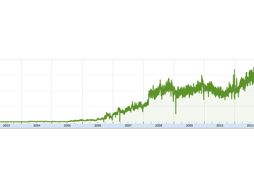
This is a graph of revenue over time for one of my sites.
Everything's Coming up Milhous!
I spent the last year trying to break down my success, what factors lead to good results. It started with focusing more on customer service a few years ago. But at the very core beneath that and other ideas was a focus on taking a longer term view of things, and the other good decisions followed.
I've always taken my time with ideas because I didn't have the resources to do it any other way.
Taking a long term view is the first step in jumping off the go-go-go train of Techcrunch & funding & startups, and losing the short term grow big/grow fast kind of mantra.
Taking a long term approach isn’t easy, it’s the long slow road, and often involves a lot of work. Sometimes it might seem the going big/fast route is easier if you can hand off lots of things to others.
I like to think of funded startups vs. bootstrapped web sites like the split between signed and unsigned bands.
Think about what a band has to do if they sign with a major label. They write music, perform/record it, and play it. Now think about people like Prince, Aimee Mann, etc. that do every single aspect of their music themselves. They have to create and record and distribute music, but also book tours and hotels and hire roadies and even oversee building websites. On the positive side, those going their own way talk about making more money from lower record sales than they did on a label, even though they do a significant amount of work.

So it’s a lot of work, but I would argue it’s totally appropriate for anything that isn’t a huge world-changing idea. And there are a lot of benefits that come from it.
So start by thinking about your projects lasting ten years. What changes from that base viewpoint? If you operate with an assumption that something you just thought of will stick around and have thousands of readers/users many years from now.
Ten Years of My Life: a site I started in 2003 with the intention of taking a daily photo for ten years (the project failed after 2.5 years, when my daughter was born and I didn't have 30min to spare each day). Despite the failure I learned a ton of lessons from a long term project, getting stable hosting, choosing good software, stable workflows, backup strategies, etc.
MetaFilter: I took the lessons from my photo site and applied it to MetaFilter. After a year or two I understood that MetaFilter was bigger than just me and keeping it around was vital (I was tasked with nurturing).
The obvious stuff on a ten year site plan:
- A real stable server environment (not cheap shared hosting)
- Domains and DNS hosting that is locked and paid for through several years, with super high uptime
- Business incorporation, protecting yourself and your investment in case anything goes wrong
- (the preceding stuff isn't free...) The hardest part is figuring out how your project can pay for itself. That really determines the longevity of your project, if you can support it financially.
I want to talk especially about backups. Backups, backups backups. Everyone talks about making backups nightly of everything you have (they usually mean your main workstation so you never lose your work), but you have to go beyond that. Nothing can last ten years if it disappears tomorrow.
This may seem obvious to the more tech minded audience members, but we are quite literally building cities made of sand when we start a website that ultimately goes back to a silicon chip running in a server. Not only should you make nightly backups of everything you do, the backups should be redundant and periodically checked. You need to get obsessive about backups.
With MetaFilter, we have a three server setup, a web server, a database server, and a static file server. Backups from the web and db servers back up to each other, then to the static server box, hourly and daily. The static server box then syncs with Dropbox. So we have three copies of everything, with one of those being offsite in case the datacenter the server rack is located in explodes into flames someday.
It’s not as hard as you think to setup, just requires forethought and it helps if it's on your mind from day one of a project.
For site/web app development, longevity in your project means a lot of root changes to your site development. "Cool URIs don't change" is a good mantra to have, and there are several things you can do in your development to ensure longevity:
- Permanent, human-readable clean URLs. They should never change, never expose the technology behind them.
- Everything should degrade gracefully, even MetaFilter’s thread URLs can be cut off in email and still work.
- Be platform agnostic and flexible. We run windows & linux servers, both physical and in the cloud. We run perl and coldfusion. By design, our URLs don’t reflect that.
- Allow users to export their data from day one. User freedom, user trust, also allows them to backup their contributions or take them elsewhere in the event of a catastrophe.
I’m willing to put my money where my mouth is and accept Jeremy Keith’s challenge from an earlier talk. (update: it is now live)
A long term plan for a site has to include money. I wouldn’t necessarily say from day one making money is a huge goal, rather I’d say try and self-fund it as long as you can (it took me nearly six years before I could quit my day job) and then definitely find a way to make the site pay for itself. Start with low enough goals of just paying the server bill each month.
This is Maciej that does Pinboard, the link service.
A few months ago Maciej wrote about how services you love need to charge money and make money or they will die. He went so far as to say you shouldn’t use sites or services that won’t take your money because they will have no future.
Ask yourself “How will the project go on?” Explore as many diverse ways of making the site pay for itself as possible. Things like advertising where appropriate, memberships, pro accounts, funding drives, merchandise. Maybe the way the site is paid for itself is by you paying for it through a day job? I have nothing against perpetual side projects funded by day jobs.
I read this quote last week from a guy that started five companies in LA over the last decade, and it was about startups in Los Angeles being different than startups elsewhere in the US and I thought it was a really interesting side benefit of being in a place that at the time had no real source of VC funding.
So you’ve got a good, but not huge idea, you’ve built it into a cool web app, and you’re thinking about running it for a good long time. What is the upside to all this work?
Having a long term view makes dumb decisions easy for one thing. I get these crazy pitches all the time. Guest posts, free articles, infographics they want you to use on your site as free content. Of course all free content is really just an SEO hack meant to abuse your site’s position in Google to benefit them. Sometimes people email wanting to buy the site, and then occasionally I get introductions from venture capitalists that wants to talk to me.
And this was became kind of famously great. An ad company pitched me an idea to cloak my entire site in a one-day Chevy ad for something like $20,000. It's a crazy amount of money but it's also the ugliest, most ridiculous thing that would alienate readers and fans of my site.
For all these sorts of pitches, you just ask yourself, does this help my site stick around for many years, or is it a quick buck kind of thing? Would there be lasting damage if I said yes to these pitches (usually the answer is yes).
So you say no a lot, and you stay the course. Patience!
I do this myself with our advertising on MetaFilter. I work with a lot of people at Google, and they’re always pushing me to put more ads on a site and to make them more prominent. I relented after being asked for several years, and the money was good, but the ads became annoying and a few users complained. We tuned them down and found we lost about 15-20% of our revenue and that's a bummer, but I know it’s the best thing to do for the site going forward and I had to make the hard decision to keep the site a bit lighter on ads as a result.
One other huge benefit is being able to call the shots when you fund things yourself or through your users. You won’t have outside forces that are forcing your hand.
Granted, I fully embrace the Why Wasn’t I Consulted? mindset. It’s important to keep your users in the loop as much as possible.
I’ve been impressed with self-funded companies like Raverly (the knitting community) being totally upfront with their users about this very thing. They tell everyone just how many employees they pay, and how they pay for it.
This post came out a few weeks after Maceij’s post, and they cover how they do ads and where you can buy some, how they sell merchandise and where you can buy some, how they sell patterns and books and where you can buy them. This post not only informs their userbase it also promotes their funding methods, a totally brilliant win-win.
“WWIC” is especially true for Community projects. A community site isn’t owned entirely by the sole person or team that started it, but then the community doesn’t own it 100% either. That weird gray area of both owners and community members works when you let them see how and why you make decisions for the community, and incorporate their feedback.
One last benefit of going your own way and taking the long view. I’ve worked hard for many years on my projects and I’ve worked really hard to find the best possible people to help out. I'd say hire as early as you can afford to and hire the best possible people you can. I’ve now got five other employees overlapping talents and time to the point where I can finally take vacations like this one to Hawaii last month.
It also means I get to accomplish a goal I set out when I was 26 at my first job, and that was to never have a career that required the daily use of an alarm clock.
Seriously, those things ruin lives. Do whatever you can to arrange your life in a way that doesn't include an alarm to jolt you out of bed every morning.
Thinking of your projects on a longer timeline doesn’t mean sacrificing growth, or limiting their impact. It just means you have a more stable foundation on which to grow, a better site culture, and it works especially well for communities because a slow-growth enables a community culture among users to develop over time.
So let’s flip this and talk about some dangers of short term thinking and taking funding instead of going your own way...
The first problem you have when you take funding is that you suddenly have some outside group that has a say in your future decision making on your site. Their goals might not necessarily align with the ones you and your userbase wants.
Often times the goals of a newly funded startup are all about growing the userbase, growing revenue, or priming the site for a sale to someone else. Doing those things might not be your first priority, and they might not have to be done so quickly.
This came up when I interviewed Rob Malda of Slashdot for the webstock blog a few months ago...
and he mentioned specifically a bit about retaining control in our interview
“I imagine your work on MetaFilter might be similar- and since you’ve had the good sense to retain ownership, you are able to continue to shape your creation according to what you think is best. That matters a lot.”
Honestly, if I took VC funding, what would I even do with it? What would 5 million dollars do for MetaFilter to make it better? It really seems like it would make things worse.
Another thing to consider is that chasing funding takes anywhere from several months to a year of full time effort by your CEO, and when you get funding and you get written up on Techcrunch, people often treat that like an IPO, like you get to rest on your laurels because you have money in the bank, but really, that’s just the beginning of working much harder on the site. Your backers want results.
The other thing to consider is the way Venture Funding works. Typical venture capitalists bet on ten startups in the hopes that they average one big success. You can look at almost any VC firm to see this ratio bear out, but there are 9 failures in 10 funding events.
What about those 9 failures? Were they good enough ideas to stand on their own? Could they maybe have grown slower and had users pay for features to keep a dedicated team running them? Sometimes I think we lose something in this game of funding.
I’ve worked at two startups that failed years later, even though they were filled with good people with good ideas. Their investors usually made them follow bad paths.
It’s not all bad news though, getting funded by large VC firms or incubators like Ycombinator means you get plugged into a network of knowledgeable business people. They can help your startup behave like a grown up.
You do lose something in the process, I feel like Ycombinator in particular takes too much ownership stake from such a low investment (10% of your company for $6k/founder of investment? That seems insane), but they bet on their expertise and track record of success selling sites.
Let’s talk some specific examples of self-funded companies that are built to last.
37signals has a feature on their blog where they’ve interviewed a couple dozen sites that gross over a million in revenue a year and have never taken funding. There are some surprises in the mix...
Every programmer’s favorite code repository, Github, is self-funded. They’re doing fantastic. I pay for a company account there where I keep a bunch of private code repositories for MetaFilter. We have contractors using it extensively on their contributions as well.
Instapaper is famously a one-man show with Marco at the helm.

Lots of major blogs never took outside funding, instead relying on advertising revenue and growing very slowly over time.
Gawker was started by a guy worth a million or two dollars, but over the past ten years has grown it into a household name.
Gothamist started out as Jake Dobkin’s MBA thesis project, and they are in their 8th or 9th year, in many cities, with a staff around 30, doing really well.
The Awl network, started by two ex-Gawker writers, they grinded out tons of posts themselves with no revenue for the first few months and recently hit their 2 year anniversary and are rumored to be very profitable and have expanded to several subsites.
MLKSHK is a great simple user-supported image sharing site, sort of like a funner flickr.
Andre Torrez and his wife ran the site exclusively for the first six months or so, and when their own savings ran out, they started with pro accounts, and then took on client work to keep it going. he’s told me in retrospect, slowing down development on the site has been great, letting the community grow by word of mouth organically and their use of existing features continues to make it better. He hasn't updated much of the code in months and it's ok, the community still loves the product.
Real quickly on my own sites as examples, MetaFilter is just about 13 years old, but took me about six years to really turn a profit on it. Community sites need time to grow (we shut down new users signups and there were very few features added between 2002-2004).
Fuelly is a perfect small side project. I don’t think a public fuel economy tracker for every driver on earth is a huge startup idea, it’s a cool little project that me and the other cofounder use and enjoy. It has only cost $400/month for the life of the service so a couple years into it a small ad paid enough for the server.
- We have refused two buy-out offers and would rather keep it growing as a public resource
- A public read/write API is forthcoming
- Over 80k users, 100k vehicles, 2 million fuel records
Finally, I want to leave you with this
Startups aren’t all bad, I’ve invested my own money in two of them that I think are great potentially world-changing ideas, Kickstarter, a great way to help fund creativity online and...
Lanyrd, a great little Twitter-powered tool for tracking conferences.
It’s just that I’ve found happiness and security in pursuing the projects I love over long periods of time, and thanks to slow, nurtured growth, my projects have grown into really fun things that support not only me, but a half dozen employees as well.
They take a lot of work and a lot of patience but they also carry with it a lot of benefit. The next time you want to launch a new idea, consider my approach.
Thank you for listening.
Subscribe to our newsletter.
Be the first to know - subscribe today




